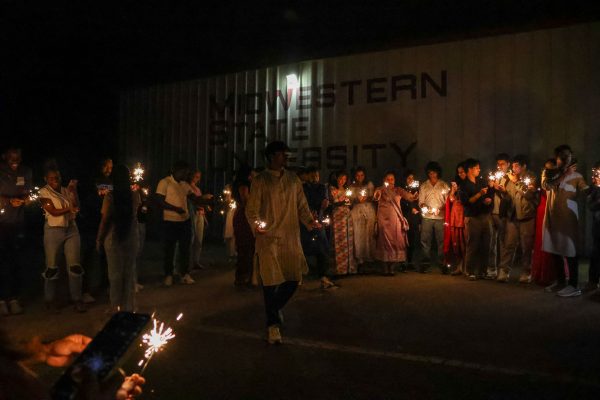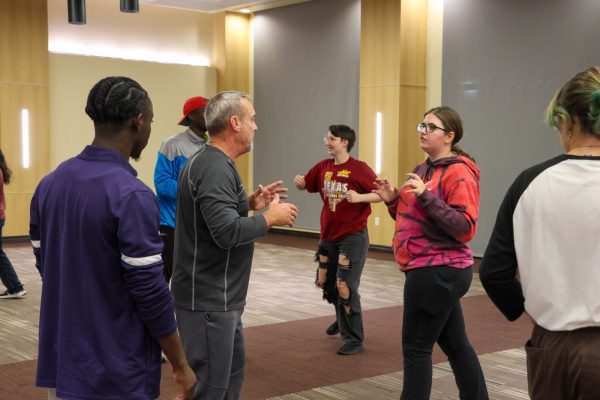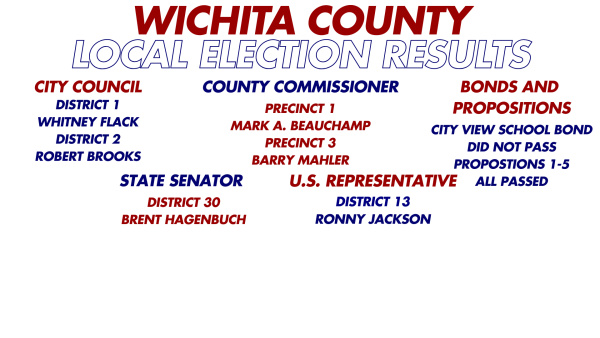Scholarship committee members allocate every penny
Thousands of dollars. Tens of thousands of dollars. Indeed hundreds of thousands of dollars. Instead of just sitting around, each department and each college provides students with scholarship money. And very little of it goes un-awarded.
Peter Fields, associate professor of English, said he thinks all the departments wish they could help students more financially.
“We all wish we had more to give. We don’t have enough. We never have enough. A lot of students work. A lot of our students borrow money. It’s a working person’s campus. There’s a significant commuter demographic. Very few people are coming from wealthy families. Very few students are completely dependent on their parents, so they’re borrowing. Every little bit of scholarship money makes a difference,” Fields said.
Prothro-Yeager College of Humanities and Social Sciences
Fields said the Perkins/Prothro Scholarship is where the big money for the PY college lies. For this scholarship, as long as students make a 3.0 GPA, they are eligible.
“The truth of the matter is, the issue for PY and for English is that we wish we had more money. We try to make it stretch as far as possible. We try to make sure that each person [that is granted a scholarship] gets enough money for it to be helpful,” Fields said. In the English department, if a student only gets a scholarship for a given semester, it may be a couple hundred dollars. For the Perkins/Prothro, at the college level, that’s usually $750 per semester.”
The dean’s office of Prothro-Yeager awards in the $30,000 range each year.
“ As far as I know, at Prothro-Yeager, it’s always given away because I was on the college level PY scholarship committee. All the money was decimated,” Fields said.
Most of the Prothro-Yeager scholarships are based off of need as well as merit.
“We’re looking for a person who can make a case like ‘I’m solely responsible for my education’ or something like that. If there’s some kind of need, we feel like we’re making a positive difference. Of course we always feel bad because we have so little money,” Fields said.
The English department has less than $10,000 to award in scholarships, which Fields said he considers a modest amount. However, There is a new scholarship specifically for English majors called the DeAnna Fergeson Lynch Scholarship.
“Somebody passed away who loved going to MSU decades ago and had a favorite English professor. Her husband [the woman that passed away] is the one who set up this scholarship. This woman had a great teacher here, and in her will she said ‘when I pass away, I want my husband to set up this scholarship.’ This scholarship provides money every year through the donations office,” Fields said.
Dillard College of Business Administration
Charles Bultena, associate professor of management, said only small amounts of scholarship money go un-awarded each year.
“We left $120 on the table last year. It does continue over to the next year. We give about $100,000 scholarships out in the business department. We pride ourselves on our very good track record with allocating scholarship money. There’s only about 0.1 percent of our scholarship money that goes unused,” Bultena said.
Scholarships for students of Dillard college include:
- Better Business Bureau/Dr. Louis J. Rodriguez Ethics Scholarship
- Dr. F. Robert Madera / Baggett Accounting Scholarship
- Mamie Raborn Scholarship
- Gotcher Economics Undergraduate Scholarship
- Jim Mims Business Scholarship
- Walsh and Watts Inc. Endowment Fund
West College of Education
Kayla Meaders, academic counselor of West college, said she sends out a quarterly email to all of the education students with scholarship information. She said two scholarships that students need to be more aware of are the Teach Grant Scholarship and the Future Educators Scholarship.
“The Teach Grant is very specific. It calls for certain majors, a certain GPA. The Future Educators is for students that were in Ready Set Teach or TAFE in high school. Those are both future teacher programs. This scholarship is for incoming freshman. I think there’s more students out there that should apply for it that don’t know about it,” Meaders said.
Although the scholarship money never technically goes unused because it rolls over to the next year, the Future Educators Scholarship isn’t being allocated to its full potential every year.
“The money for the Future Educators Scholarship is not being used as quickly as I expected,” Meaders said.
Another set of scholarships that Meaders said needs more attention are the McCoy Foundation Scholarships.
“There’s one for secondary math, secondary science, and there’s also a separate one for ELAR, social studies, or Spanish. Those are probably our most sought out scholarships because they have the highest amount of money to award,” Meaders said.
Other scholarships within West college include:
- West Foundation Undergraduate Scholarship
- Reuben Keck Education Scholarship
- Wooten Woods Teacher Scholarship
- Sam & Jo Atkins Scholarship
- Bessie King Scholarship
- D.L. & Gertrude Ligon Scholarship
McCoy College of Science, Mathematics and Engineering
Margaret Brown Marsden, dean of McCoy college, said her college often has more demand than they have scholarships available.
“A lot of the departments will go over in their funds, so I’ll have a department come to me and say ‘we have eight students we’d like to give scholarships to, and there are two that we haven’t got enough money for. So I’ll be able to make up that difference,” Brown Marsden said.
Brown Marsden said her college typically allocates $60,000 to $75,000 in scholarships annually.
“To me, it would be terrible if scholarship money didn’t get used. We would be holding on to something that students can really benefit from,” Brown Marsden said. “In January, we were notified that a donor gave us some money to give scholarships, so we tried to find students to give them to immediately because I just didn’t want it [the money] to sit there for a semester. I needed to put it to action.”
Brown Marsden said the McCoy College supports science students studying abroad.
“It’s really important for every student to have that opportunity to study abroad if they can. We have two study abroad experiences coming up. One is new in computer science, and one is global health and wellness, which only started last year.” Brown Marsden said. “We’ve been giving students scholarships for study abroad because that sometimes can make the difference for them. Sometimes it’s not a lot, but every little bit counts for a student.”
Scholarships that students of McCoy College can apply for include:
- McCoy School of Engineering Undergraduate Engineering Scholarship
- Prescott Scholarship
- Welch Scholarship
- National Association of Geoscience Teachers Field Study Scholarship
Gunn College of Health Sciences and Human Services
Courtney Denise Snyder, assistant to the dean of Gunn College, said, “Usually they [department scholarship committee members] don’t have any money that goes unused. They pretty much spend down to the penny.”
Snyder said they divide scholarship money to the departments based on the number of students in the program.
“There are departments that have scholarships that are just specific for them. Radiology has a scholarship only for radiology students created by faculty members in honor of someone that passed away,” Snyder said.
Respiratory and social work departments also have similar memorial scholarships. Snyder estimated the total amount of scholarship money awarded in each department:
- Athletic Training: $8,700
- Dental Hygiene: $5,000
- Nursing: $47,000
- Radiology: $27,000
- Respiratory: $14,000
- Social Work $8,500
Fain College of Fine Arts
Scholarships for Fain College students include:
- Tres Hood
- Suzanne Espinosa
- There is a scholarship for each of the four departments of Fain (music, art, theatre, music and mass communication).
Mark McClendon, director of institutional research and assessment, provided this list of the sources of financial aid for students. This is the number of students who received each type of award. It does not include exemptions or waivers.
| STUDENTS RECEIVING AWARDS | FALL 2017 | SPRING 2017 | SUMMER 2017 | 2017-18 Total | ||||
| AGGRAGATED NUMBERS | Total # of Awards | SUM | Total # of Awards | SUM | Total # of Awards | SUM | Total # of Awards | SUM |
| ATHLETIC SCHOLARSHIP TOTAL | 254 | $1,055,738 | 248 | $1,017,510 | 266 | $2,073,248 | ||
| SCHOLARSHIP TOTAL (Non-Ath) | 2471 | $3,219,514 | 2210 | $2,906,527 | 334 | $446,328 | 2871 | $6,572,369 |
| GRANT TOTAL | 2511 | $8,094,370 | 2311 | $7,338,625 | 771 | $1,271,500 | 2932 | $16,704,494 |
| LOAN TOTAL | 3053 | $15,967,001 | 2860 | $15,400,203 | 674 | $2,530,152 | 3515 | $33,897,356 |
| WORK TOTAL | 88 | $93,388 | 78 | $93,101 | 21 | $18,127 | 109 | $204,616 |
| GRAND TOTAL | 4716 | $28,429,742 | 4455 | $26,755,967 | 1224 | $4,266,106 | 5336 | $59,452,084 |
| *** Total Number of Students Receiving awards. | ||||||||







